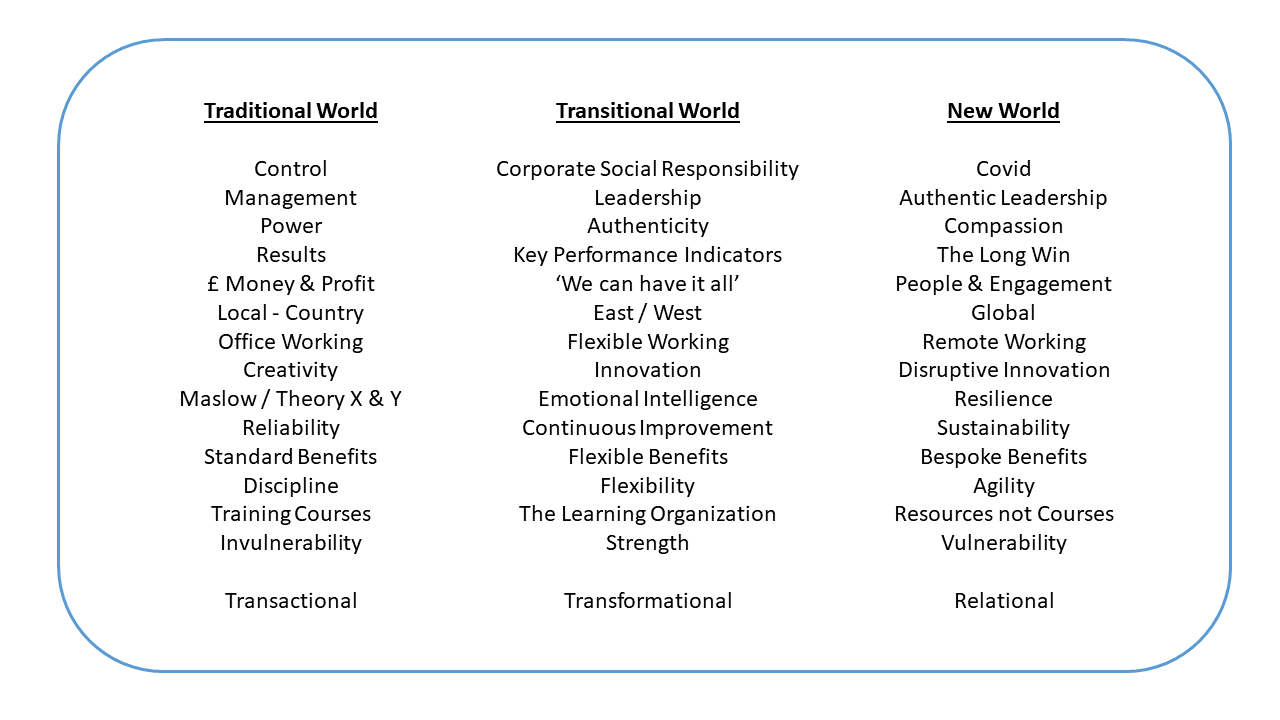The original thinking behind this article used Covid-19 as its starting point; a dichotomous ‘old’ and ‘new’ conversation about how leadership and leadership priorities have changed for us since the pandemic began.
But as I started to list the differences between our old and new worlds I realised that in-between them we actually experienced a transitional leadership state. And it’s this Transitional World and its associated leadership characteristics – dating back to around the new millennium of 2000, that has, in reality, been paving the way for the kind of leadership that we are needing right now, and will continue to need for the foreseeable future.
The Old/Traditional Leadership World was a place where managing, control and the new ‘science’ of management took center stage. Dating from beliefs around productivity in the Second World War, ideas such as Maslow’s Hierarchy of Needs and McGregor’s Theory X & Y dominated the thinking. People were ‘units of production’ and they didn’t really have a voice. If they did speak up, no-one was really interested in anything they had to say.
Leadership was about power. It concerned money, profit and ‘bottom-line results’. Consistency and reliability were the management maxims and while creativity would be encouraged, it was generally limited to generating new product lines. White collar workers were always office-based and our thinking was local; limited to our own country. A far cry from the global environment we experience today.
Everything was standard and standardized; nothing was bespoke. Discipline was key and the relationship between an organisation and its employees was strictly a transactional one. The lucky few attended ‘sheep-dipping’ training courses, designed to churn out people who looked, sounded and thought the same way. Businesses such as ICI, Ford and Shell were monoliths; invulnerable. A whole career could be built and spent inside one.
The Transitional World of the last two decades before the new millennium and the two after it has been one of corporate social responsibility. Leadership and authenticity were the new buzzwords and a plethora of key performance indicators filled the skies like Hitchcock’s birds. Because of new flexible working practices there was a feeling that ‘we could have it all’ and limited creativity gave way to innovation in all areas.
The Berlin wall came down and paradoxically, with a now united West, the dichotomy of thinking became between that of the West and the East which was rapidly developing and becoming a new super-power to be reckoned with.
Suddenly everyone was required to develop their emotional intelligence. We had to become flexible and continuously improve. Leadership was Transformational and we were being transformed by Kaisen whether we liked it or not. Businesses became learning organisations, and Purpose was designed to drive profits; these firms were strong and Built to Last.
The two previous leadership environments are very different to the New World we now find ourselves living in. Covid-19 has become our greatest threat and yet paradoxically could also become our greatest salvation as we ultimately have to learn to live together and collaborate on a shared planet.
The Traditional focus on reliability has shifted towards genuine sustainability which can only be achieved through cognitive fitness and disruptive innovation. Conventional training is slowly becoming replaced by new thinking around resources not courses in an online virtual world where working and learning are increasingly going to be done remotely.
People and organisations are now vulnerable; physically, emotionally and mentally. Despite implementing their immediate short-term strategies for survival, forward thinking leaders are already focusing on the long win rather than short or medium-term KPIs. Kindness matters, as it always did. It’s just that now it matters more.
Authenticity has, thankfully, finally given way to a greater understanding of Authentic Leadership; a relational style of people-focused interactions, the key tenets of which are trust and compassion which drive psychological safety, engagement and resilience.


Understanding how leadership and perceptions of leadership success have changed over time are critical to understanding the kind of leader you are.
Which world do you feel most comfortable in? What is your underpinning philosophy of leadership and how are you going to make our new world a better place to be?
Written by
